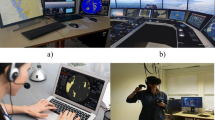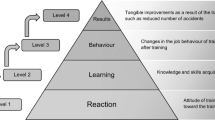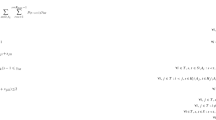Abstract
Means of improving the training of air traffic controllers are considered. It is suggested that their training may be assessed on the basis of their ability to perform specific management activities, using the activity model of training. The concept of incompetence is introduced. In training, incompetence should be minimized. Incompetence is quantitatively estimated in terms of the level of relative incompetence, measured on a scale from 0 to 1. Optimization of the training process involves balanced formulation of the curriculum in accordance with the corresponding educational program. A network flow model permits balancing. Optimization is based on an algorithm for optimal balancing of the training process in terms of specific types of management activity.



Similar content being viewed by others
REFERENCES
Shadrikov, V.D., Development of basic competencies based on the activity approach (by example of pedagogical activity), Mir Psikhol., 2014, no. 3, pp. 105–119.
Zimnyaya, I.A., Competence and skills in the context of a competency-based approach in education, Uch. Zap. Nats. O-va Prikl. Lingvistiki, 2013, no. 4 (4), pp. 16–31.
Bondarev, I.P., Tin’kov, A.N., Perepelkin, S.V., et al., Age-experience dynamics of psychophysiological professionally significant qualities of operators of technological processes, Bezop. Zhiznedeyat., 2010, no. 1 (109), pp. 29–32.
Shraiber, E.G., Competence-based approach in the education of professionally significant personal qualities of future lawyers, Vestn. Yuzhno-Ural. Gos. Univ., Ser.: Obraz., Pedagog. Nauki, 2010, no. 12 (188), pp. 25–30.
Pustovalova, E.I., Development of professionally significant qualities of specialists of the Russian State Fire Service of the Ministry of Emergency Situations of the Russian Federation based on interactive education methods, Izv. Ural. Gos. Univ., Ser. 1: Probl. Obraz., Nauki Kul’t., 2010, vol. 78, no. 3, pp. 116–122.
Troitskaya, E.A., A model for management of the development of professional competencies in the context of distance learning, Fundam. Issled., 2017, no. 11-1, pp. 128–132.
Apen’ko, S.N., Assessment of the competencies of masters and bachelors in the management system of educational services, Probl. Teor. Prakt. Upr., 2010, no. 2, pp. 88–92.
Verbitskii, A.A., Teoriya i tekhnologii kontekstnogo obrazovaniya: uchebnoe posobie (Theory and Technology of Contextual Education: Manual), Moscow: Mosk. Pedagog. Gos. Univ., 2017.
Bondarenko, Yu.V., Goroshko, I.V., and Vasil’chikova, E.V., Expert-test mechanism for the comprehensive assessment of candidates in the personnel selection, Vestn. Yuzhno-Ural. Gos. Univ., Ser.: Komp’yut. Tekhnol., Upr., Radioelektron., 2020, vol. 20, no. 1, pp. 100–110.
Kholostov, K.M., Education of the heads for internal affairs bodies to decision making in a negative scenario conditions, Trudy Vserossiiskogo nauchnogo seminara “Aktual’nye voprosy upravleniya v sotsial’no-ekonomicheskikh sistemakh” (Proc. All-Russ. Sci. Seminar “Urgent Problems in Management in Social-Economic Systems”), Moscow: Akad. Upr. MVD Ross., 2016, pp. 3–7.
Kholostov, K.M., Metody i algoritmy raboty avtomatizirovannykh kompleksov podgotovki rukovoditelei organov vnutrennikh del (Methods and Algorithms for Automated Education Complexes for Heads of Internal Affairs Bodies), Moscow: Akad. Upr. MVD Ross., 2016.
Kholostov, K.M., Possible improvement of the education system of heads for internal affairs bodies of the Russian Federation in the context of educational reform, Balt. Gumanit. Zh., 2018, vol. 7, no. 4 (25), pp. 331–336.
Basaker, R.G. and Saati, T.L., Finite Graphs and Networks: An Introduction with Applications, New York: McGraw-Hill, 1965.
Schrijver, A., Theory of Linear and Integer Programming, Chichester: Wiley, 1986.
Ahuja, H.N., Construction Performance Control by Networks, New York: Wiley, 1976.
Karzanov, A.V., The identification of maximum flow in the network by the preflow method, Dokl. Akad. Nauk SSSR, 1974, vol. 215, no. 1, pp. 49–52.
Goldberg, A.V. and Tarjan, R.E., A new approach to the maximum-flow problem, J. Assoc. Comput. Mach., 1988, vol. 35, no. 4, pp. 921–940.
Kim, R.V., Evdokimenkov, V.N., and Popov, S.S., Intelligent control of a group of unmanned aerial vehicles operating in a join information and control field, Materialy XVII Mezhdunarodnoi konferentsii po nauke i tekhnologiyam Rossiya-Koreya-SNG (Proc. XVII Int. Conf. on Science and Technologies in Russia-Korea-CIS), Moscow: ANTOK, 2017, pp. 197–204.
Evdokimenkov, V.N., Krasil’shchikov, M.N., and Orkin, S.D., Upravlenie smeshannymi gruppami pilotiruyemykh i bespilotnykh letatel’nykh apparatov v usloviyakh edinogo informatsionno-upravlyayushchego polya (Management of Mixed Groups of Manned and Unmanned Aerial Vehicles in a Joined Information and Control Field), Moscow: Mosk. Aviats. Inst., 2015.
Lazarev, A.A. and Gafarov, E.R., Teoriya raspisanii. Zadachi i algoritmy (Schedule Theory: Tasks and Algorithms), Moscow: Mosk. Gos. Univ., 2011.
Author information
Authors and Affiliations
Corresponding author
Additional information
Translated by B. Gilbert
About this article
Cite this article
Kholostov, K.M., Goroshko, I.V. Optimal Planning of Professional Training for Air Traffic Controllers. Russ. Engin. Res. 42, 85–88 (2022). https://doi.org/10.3103/S1068798X22010087
Received:
Revised:
Accepted:
Published:
Issue Date:
DOI: https://doi.org/10.3103/S1068798X22010087




